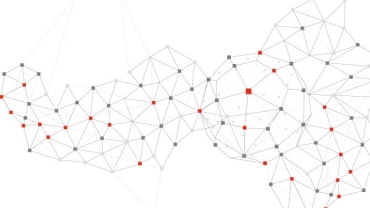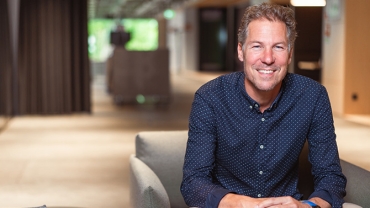
Digital transformation NS
By merging the Commercial and IT departments, Nederlandse Spoorwegen (NS) took the first steps towards a radical transformation even before the coronavirus took hold of the Netherlands. "We are going to do things completely differently", says Ivo Steffens, Director of Commerce and ComIT Lead. "Have we planned it all to the finest details? No. But we are very clear about where we want to go. We are about to respond to the rapidly changing needs of digital consumers by becoming much more agile."

Restart as a result of the coronavirus
"2020 will be remembered as a year that led to changes that came as a surprise to us all", Ivo Steffens begins at the almost deserted NS headquarters in Utrecht. "We at NS have shown that we can adapt quickly to the new reality across the board. We made sure that key workers could continue to travel by train and were quick to look at how the coronavirus and the measures to combat it would affect us in the long term."
NS saw its 10.7 million passengers a year fall to just ten per cent of that when the crisis hit its deepest point. People have started travelling by train again, but working from home is proving to be a serious 'competitor' that NS will be facing in the future. "The coronavirus outbreak is a kind of reset and restart", Ivo Steffens continues. "It creates an urgency to respond to events faster and differently and to work out how we can offer passengers the right product at the right price under these new conditions. We want to reinvent ourselves, to take a fresh look at what we do and how that fits in with that new reality."
Merging Commerce and IT
Even before the coronavirus outbreak, NS had taken an important step towards doing things differently: bringing the Commerce and IT departments together in a new structure: ComIT. "Commerce and IT are mutually dependent because virtually any commercial change for passengers calls for an IT solution", Ivo Steffens explains. "ComIT's goal is to put in place – within a few years – a strong and resilient organisation that can respond to the rapidly changing needs of our passengers. Our organisation is now completely divided into cross-disciplinary teams in which our ComIT people work together on a goal. These teams are agile and you can quickly free them if priorities change."
Horizontal organisation, cross-disciplinary teams
The new department was immediately put to the test when the government announced drastic coronavirus measures the day after the official launch in March. "People sometimes say, 'an organisational change during the coronavirus crisis is the worst possible timing'...", says Ivo Steffens. "Undoubtedly, it is a challenge. We have seen two traditionally hierarchical business units undergo a major change. Now we have become a truly horizontal organisation with cross-disciplinary teams, and that takes some getting used to. It is easy to say: three days after the launch, and then the coronavirus lockdown: what a disaster! But you could also say that people having to work from home – with all the challenges that entails – helped to cut through the old office grapevine for a while."
Space to develop and flourish
"It also helped that we developed the new department together. Almost all five hundred ComIT colleagues were involved in shaping the new organisation. That is where a very large part of the change was found. Is it proving easy? No. Will we have to grow into it? Certainly. It is never easy to let go of the old ways. In the previous, more conventional organisation, you had a clearly defined job and work area. People have to get used to the idea that they now have a role – possibly a new one – that is more flexible. They are really enjoying that because it means being able to work here for three months, and then somewhere completely different for another three months, which gives them the space they need to develop and flourish. But that does call for a different mindset. I am really proud of what we have achieved together so far. The coronavirus outbreak has also made it easier for us to let go of the old so that we can speed up the launch of this new structure and focus on giving our passengers the best possible service."

"The coronavirus outbreak has also made it easier for us to let go of the old so that we can speed up the launch of this new structure and focus on giving our passengers the best possible service."
From rail company to mobility company
To Ivo Steffens, the most important thing of all is to continue to focus on how to be appealing to passengers. He places transporting passengers on par with hospitality. "We need to look at how we can speed up our innovative capacity in terms of making improvements to the products and services our passengers use. We as NS want to grow from being a rail company into a mobility company. That also means having different offerings for our customers: not just considering how we can create a train subscription, but also how we can respond to the additional needs of passengers who want to travel not only from station to station, but also from the station to their final destination. In a nutshell, we want to be a door-to-door service provider. In 2019 we saw our secondary means of transport such as Greenwheels (car sharing), OV-fiets (bike sharing) and Zonetaxi (taxi sharing), grow by more than thirty per cent year-on-year. This mobility market is rapidly developing, and we can offer passengers much more in this area. That calls for decisiveness in developing our commercial propositions."
Co-creation with passengers
NS conducts a lot of research to find out what passengers want. Contact is made with individual customers via the community at NS.nl or via the NS Lab app, where passengers can try out the very first form of innovation in practice and provide immediate feedback. "We developed that special Lab app to make it easy to experiment", says Steffens. "We work with passengers to see how new functionalities work out before we offer them in our NS app. For example, we now use the Lab app to offer electric scooters for passengers to continue their journey when they arrive at their destination station. This service stems from a pilot with GO Sharing, a company offering electric lease scooters in several large cities. We took our registration service – a non-obligatory service to ensure that people can travel safely during the coronavirus outbreak – from idea to execution in three weeks. That was partly down to our new way of working. This summer, we also provided the service on the route to Zandvoort to encourage people not travel at the same time . We are also working – together with the city transport operators HTM, RET and GVB – on developing a technical platform we can use to offer mobility as a service more easily and effectively. In our work – and especially in these uncertain coronavirus times – we try above all to respond in a very agile way to what we see happening and the ensuing needs. We do that by keeping a close eye on the outside world and translating what we see into how we can offer the passengers something that is attractive and worthwhile. That is the most important thing of all."
Shaping the new reality together
For individual passengers – the consumer side – we are seeing a very cautious recovery, not least owing to the relaxation of the coronavirus measures and the summer holidays. "But", Ivo Steffens is quick to warn, "things aren't back to what they were by a long shot. And that is even more true of the business segment, where we aren't yet seeing the same degree of recovery. That in itself is understandable, because 'working from home' has now suddenly been added to passengers' travel modalities, which presents a huge challenge and a lot of uncertainty for the future, because working from home has suddenly taken off. For the business market, we are looking for propositions that fit in with what our customers want in the new reality. We have written to 55 large Dutch companies that we are proud to have as customers. Almost all of them want to talk to us, work together and think about this new reality and how we can shape solutions together. In fact, that is what PwC calls 'Let's create tomorrow_'. To me, it is great that it happens this way: it leads to new things and forms of partnership that you might not previously have thought possible. To give an example, we are now introducing subscriptions for commuters who are only going to the office a few days a week for the time being, and together with various parties we are looking at ways of achieving a better passenger spread. Making sure that passengers don't all travel at the same time is vital to increasing passenger numbers. Ultimately, that's the mobility company I would like us to become. And I don't want it to be just me saying that, but for our passengers and other stakeholders to be on the same page. I am convinced that we as NS can become that mobility company if we keep listening to what our passengers want and always respond accordingly."

"We need to look at how we can speed up our innovative capacity in terms of making improvements to the products and services our passengers use. We as NS want to grow from being a rail company into a mobility company. That also means having different offerings for our customers: not just considering how we can create a train subscription, but also how we can respond to the additional needs of passengers who want to travel not only from station to station, but also from the station to their final destination. In a nutshell, we want to be a door-to-door service provider."
Contact us



















